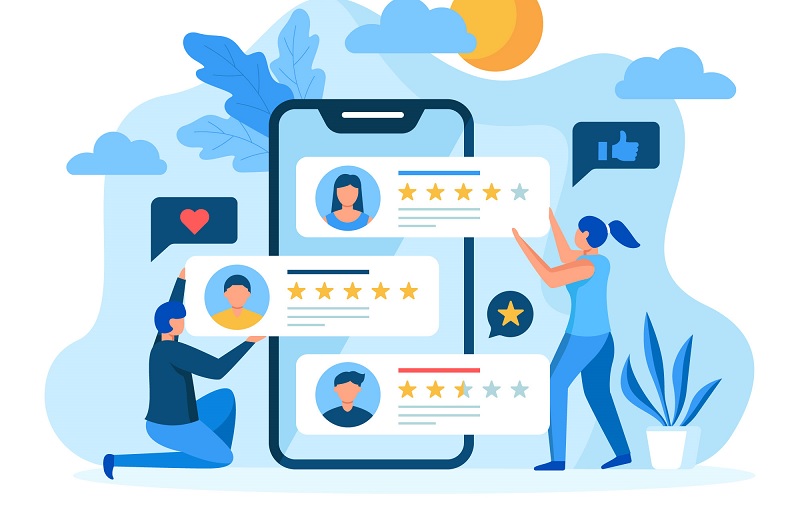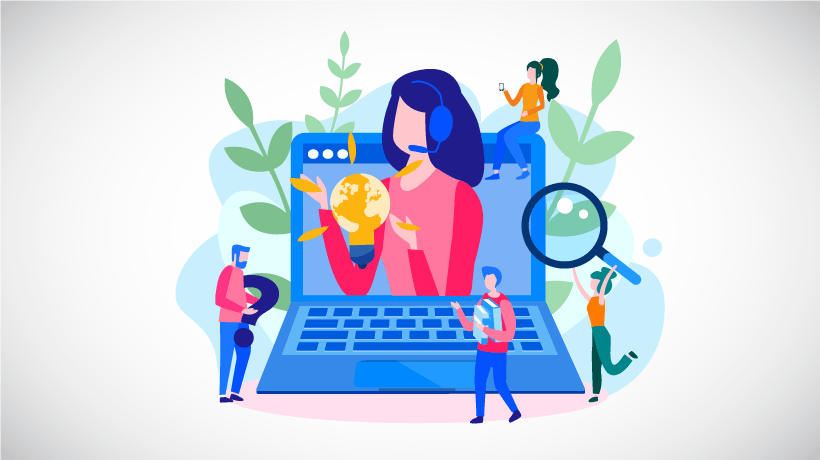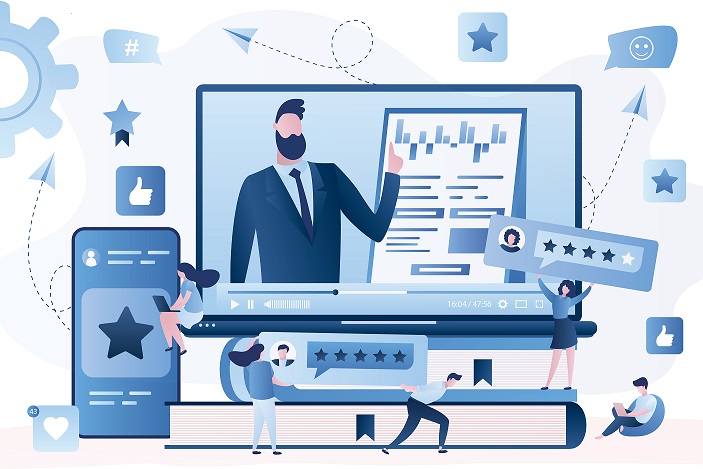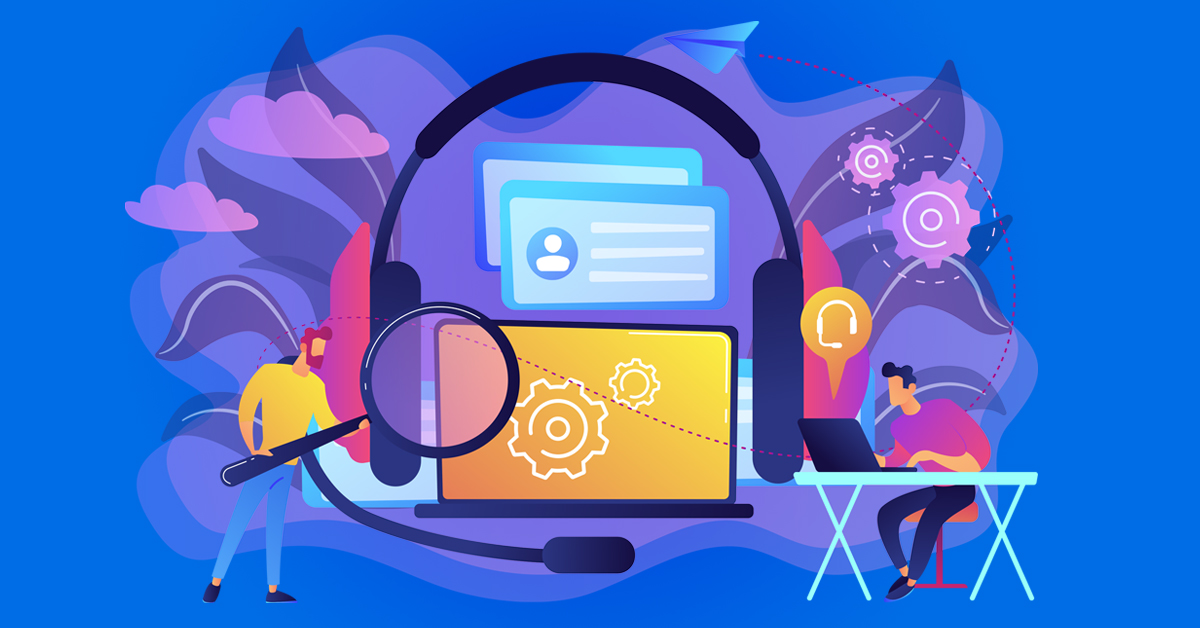
One of the most crucial facets of your business–no matter your industry, niche, or size–is customer service.
Not only does top-notch customer service retain your current customer base and help extract more value for them, but it also can be an essential selling point that can win you new, lasting customers.
But modern-day customer service isn’t as simple as setting a reliable employee up by phone to field calls. Not only is this an outdated way of looking at customer service, but it’s also highly unsustainable for growing businesses that want to provide around-the-clock customer service for their customers.
Enter the concept of self-service software.
Research suggests customers actually prefer to figure out answers for themselves and solve their own problems, so they don’t need to contact a live customer service representative.
According to the Harvard Business Review, about 81% of all customers attempt to take care of issues themselves before reaching out to a live representative.
This method of customer self-service is becoming the norm, with about 74% of customers desiring the ability to solve product or service issues on their own. That same report even mentions that a third of those surveyed reported they’d prefer to clean a toilet than speak to customer service.
That’s a pretty vivid illustration of how crucial customer self-service is to your customers, isn’t it?
But what exactly do these systems look like, and further, what do you need to know about customer self-service before you implement software of your own?
Keep reading to learn:
- What is Customer Self-Service Software
- Benefits of Providing Self-Service for Customers
- Customer Self-Service Software Features
- The 12 Best Self-Service Software Choices
What is Customer Self-Service Software?
Customer self-service software is a digital solution designed to equip customers with the tools and information they need to resolve their inquiries and issues independently. This software typically includes features like automated FAQs, interactive chatbots, user-friendly knowledge bases, and guided troubleshooting tools.
The key objective of this software is to streamline the customer's journey to problem resolution, making the process as efficient and straightforward as possible. By integrating intelligent technology, these platforms can provide personalized and context-specific assistance, enabling customers to find precise answers to their queries.
From a business perspective, this software is a strategic asset. It not only enhances customer satisfaction by offering immediate and round-the-clock assistance but also optimizes operational efficiency. By reducing the volume of direct customer service inquiries, it allows businesses to allocate their human resources to more complex and nuanced tasks.
In essence, customer self-service software is a bridge between customer independence and business efficiency. It represents a shift from traditional, representative-dependent service models to a more empowered and self-sufficient customer approach.
The Benefits of Providing Self-Service for Customers
Before you dive into this section, know that this is by no means a comprehensive list of the benefits that a customer self-service software can bring your company and your customers. That being said, if you do choose to invest in a high-quality, reliable system, you can anticipate benefits like these:
1. Slash Your Customer Support Costs
Transform your customer service model. Instead of your team being swamped with endless tickets, empower your customers with self-help tools like community forums, well-crafted FAQs, and responsive chatbots.
The result?
You dramatically cut down on customer service expenses and resource allocation.
2. Elevate the Customer Experience
Picture the customer who dreads traditional customer service. For them, self-service software is a liberating alternative. No more frustrating waits or navigating through complex phone menus. They get immediate, straightforward solutions, leading to a surge in customer satisfaction and loyalty.
This enhanced experience not only retains existing customers but also attracts new ones who value efficiency and autonomy.
3. Faster Customer Support Resolution
Of course, a skilled representative can solve customer issues quickly, but no matter how fast they are, the customer still needs to be ready to deal with the amount of time it takes to get in touch, wait to be connected, ensure they’re talking to the agent who can identify the issue, walkthrough fixing it, and follow up adequately.
This is particularly true when there’s high call volume, longer wait times, and other factors slowing the process down.
A self-service approach can dramatically speed up the time it takes for a customer to resolve their issue. Reading documentation, FAQs, or being directed by a chatbot is a far more streamlined option for customers with uncomplicated problems that need easy resolutions.
As a bonus, it also keeps agents free to deal with more complicated issues that require a live representative.
4. Around-the-Clock Support
Offering round-the-clock support traditionally comes with high costs. Self-service software changes this equation, allowing you the ability to provide 24/7 customer support at a fraction of the cost.
Your customers get the assistance they need whenever they need it, a vital service in our global, always-connected world. This continuous availability is a powerful tool in maintaining customer satisfaction and loyalty.
5. Reduces Support Tickets
When you make high-quality, empowering information, resources, and assets available to your customers via your self-service software, you give your customers the tools they need to resolve their problems. But you’re also giving yourself and your team an appropriate break.
This type of self-service software can allow customers to not only identify but resolve their own issues–this means your team won’t need to create tickets, route issues, solve problems, or provide follow-ups. What does this mean for your team? They won’t be bogged down with simple tickets that have straightforward answers.
This reduction in tickets can not only free up your team to tackle bigger, more complicated tasks but also speed up the resolution time for the more complex tickets.
6. Guide Customers to the Right Resources Directly
Self-service software acts as a direct conduit to the needed information.
Customers bypass the potential back-and-forth with customer service and go straight to the source. This direct access saves time for both your customers and your team, improving efficiency and reducing the likelihood of frustration caused by miscommunication or delayed responses.
7. Boost Customer Acquisition
The ease and efficiency of self-service are powerful tools in attracting new customers. A positive initial interaction with your self-service options can be a key differentiator, setting the tone for a long-term relationship. This approach not only streamlines the customer journey but also showcases your commitment to customer convenience and modern service approaches.
Features of Customer Self-Service Software
While every customer self-service software will look different, many of the well-designed and high-quality tools will offer at least one of the following components and features to ensure that customers are better able to serve themselves.
For the best results when you’re searching for the best customer self-service software, ensure you’re looking for systems and platforms that include at least one of the following components.
Customer Portal

A customer portal is basically the interface portion of whatever self-service software you use. It's where customers go and interact in an attempt to find an answer to any question they may have.
Knowledge Base
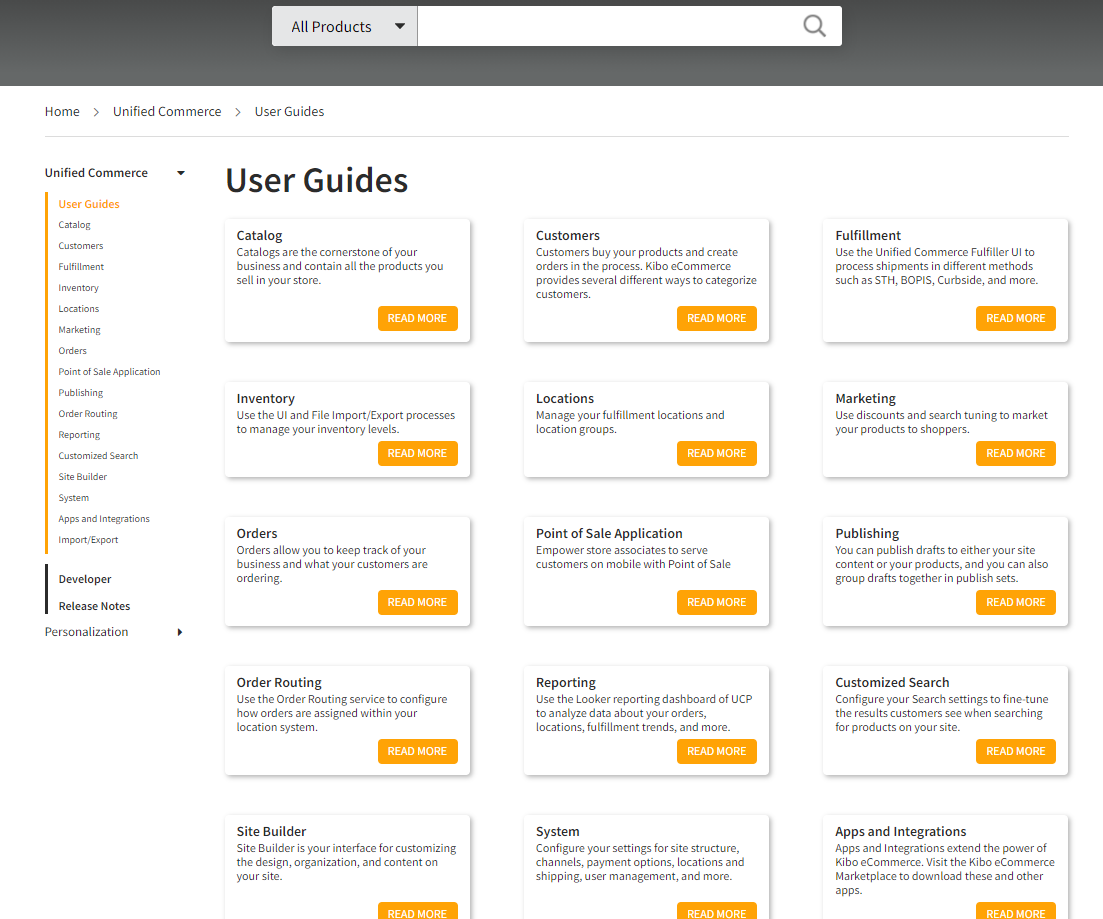
One of the best ways to enable self-service to customers is to make use of a knowledge base - specifically an external KB (also known as a customer-service knowledge base).
A self-service knowledge base is a digital library that’s carefully organized with information about services, departments, products, or topics.
Essentially, knowledge bases are comprehensive hubs of knowledge that can provide your customers with the detailed, dynamic information they need to solve their own problems, learn about your products, understand your services, and resolve their issues.
When implemented properly, a knowledge base will help offload customer support calls and tickets by providing solutions to typical problems your customers may face. You can build a knowledge base quite easily using an AI-boosted knowledge base platform.
Ticketing System
Though self-service software is intended to reduce the need for customer service tickets, it is likely that there will be times when a live customer service agent will need to assist a consumer. That’s where a help desk ticketing solution comes in.
Ensure that as you create a self-service system, you look for software that includes a streamlined ticketing feature that links customers to live representatives when self-service options cannot provide resolutions.
Live Chat
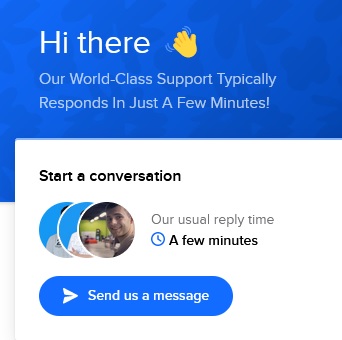
Live chat puts your customer service reps front and center online to answer queries as they come in. No matter how comprehensive your self-service features might be, a time will come when a customer will either need or will prefer to speak to a live representative. Live chat can expedite the customer service process by providing immediate assistance from a live representative.
Chatbot
The best chatbot software can direct customers to the appropriate content, links, assets, or pages is a must-have feature in any self-service software.
Chatbots are unique because they’re not static in the way FAQ pages or documentation can be. Instead, chatbots that are paired with knowledge base software can offer dynamic advice and provide customers with elevated and personalized interactions.
Further, chatbots can help save time for your customer service team by asking the basic queries that need to be asked to resolve issues.
Community Forum

A community forum is a space that typically allows other users the freedom and flexibility to post questions, provide answers, and open discussions about your products and services.
Community forums are a crucial part of all well-designed self-service software, but it’s important to monitor your community forum to ensure topics stay on track and resolutions are being provided.
The Best 12 Customer Self-Service Software
As you might have assumed, there are a lot of customer self-service software options out there. And, again, as you might have guessed, they’re not all created equally. We’ve compiled a list of the must-consider customer self-service software out there.
1. Helpjuice
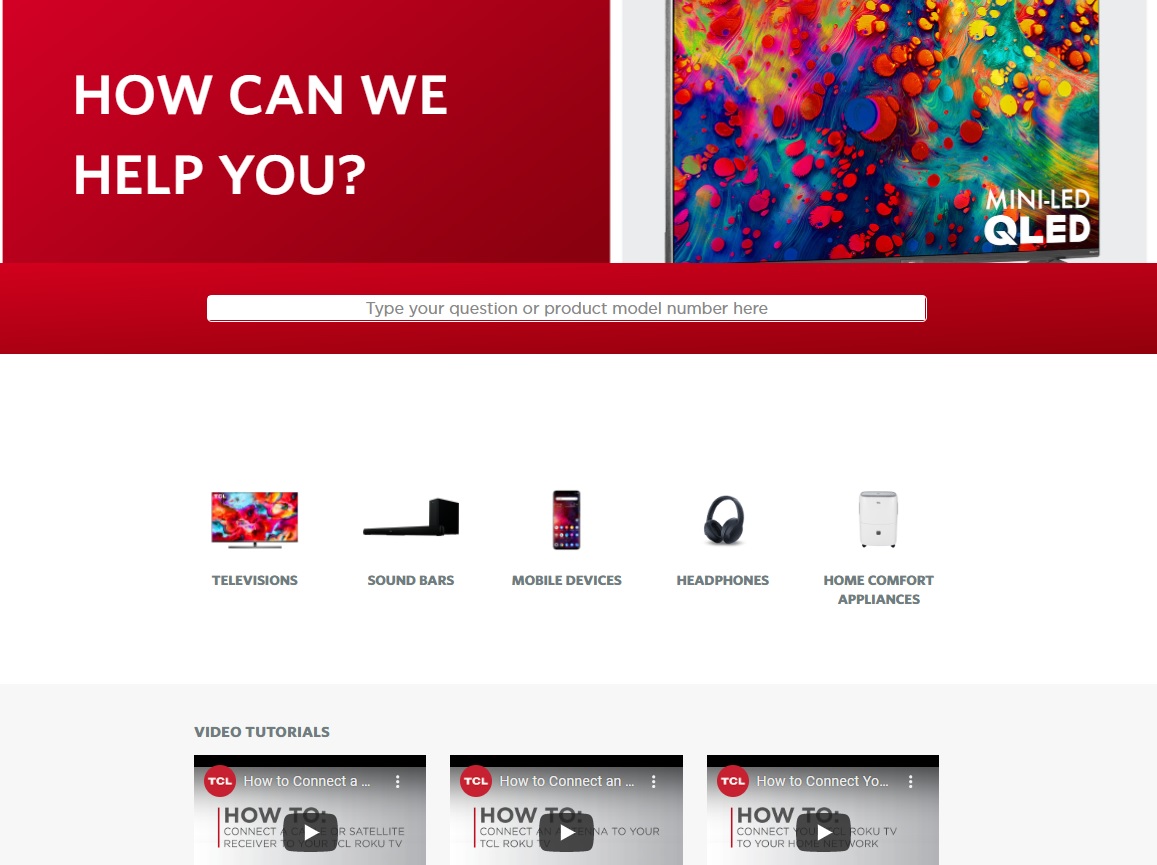
Helpjuice is a knowledge base solution that empowers users to create and share their own knowledge base to collect, organize, find, and share any company knowledge–among their internal and among customers for a high-quality self-service customer portal.
Consider Helpjuice the Swiss army knife of knowledge base and customer self-service, offering a foundation of knowledge management and robust customer service features that make it easy for customers to resolve issues without the help of live representatives.
Highlights:
- Seamless search engine style to help customers find the right answers quickly
- Advanced analytics that empowers you to find your customers’ favorite topics (or most frequently asked questions)
- Easy integrations with your favorite support ticket software for seamless support
2. LiveAgent

Equipped with features like tickets, live chat, knowledge base, and beyond, this software can help streamline communication channels and manage them from a single inbox for simplified customer care.
Highlights:
- Equipped with 180 help desk features and over 40 integrations to ensure businesses of all sizes, niches, and industries can incorporate into a workflow
- Includes unlimited ticket browsing history, comprehensive social media integrations, call recordings, hybrid ticket streams, and more
- Claim to fame is its ability to take customer inquiries from any platform or channel–email, calls, chats, social media, self-serivce, etc.–and streamline requests all in one place
3. Hubspot Services Hub

Provide powerful and flexible support for customers through personalized, 24/7, flexible channels. Service Hub’s claim to fame is its ability to connect all customers' service data and channels into a single CRM platform to help support and retain a customer base. Features like a knowledge base, customer portals, and omnichannel messaging are available as part of this software option.
Highlights:
- Includes features like ticketing, team email, email and chat to ticket, ticket creation bots, reporting, email templates, live chat, calling, and more
- Offers the option to start with free tools, gradually expanding with starter, professional, and enterprise options with flat monthly pricing
- Features a customer relationship management module that allows enterprises to organize customer details and track the progress of interactions down the sales pipeline
4. Gladly

Considered an all-in-one customer service platform, Gladly offers enterprise customer solutions that span voice, IVR, text, chat, in-app chat, social, email, and beyond.
Highlights:
- Includes features like conversation timeline and customer details to help track and monitor progress through the entire lifespan of clients
- Features a unique tool called People Match that directly matches customers with what they call the “best service hero” to help based on their situation, needs, and history
- Offer seamless integrations with applications like Shopify, Magento, Delighted, and many more, along with actionable insights and reports to help optimize training customer service representatives
5. Help Scout

Offering streamlined and scalable solutions, Help Scout masterfully empowers enterprises to build better customer relationships with their all-in-one support platform. With over 12,000 businesses using Help Scout, the designed-for-simplicity platform empowers users to learn the basics of the program in under an hour.
Highlights:
- Built with seamless scalability in mind featuring over 50 integrations, a suite of support tools, automation features, and more
- Includes features like shared inbox, live chat, in-app messages, and more
- Offers out-of-the-box reporting that tracks customer data points, creates custom views, and offers integrations for further cross-anaylsis of data
6. Salesforce Service Cloud

One of the most popular customer self-service platforms out there, Salesforce Service Cloud provides an AI-powered workflow and automation-first software to help track and connect your customer’s requests seamlessly.
Highlights:
- Includes features like live agent, omnichannel messaging, knowledge base, email-to-case, skill-based routing, milestone tracking, and more
- Features mobile capabilities, allowing customer service requests to be managed from anywhere
- Lightning Console, a tool designed to unify the agent experience with all the customer information, profiles, dashboards, case histories, details, and more
7. TeamSupport

With optimization in mind far past just ticket management, this omnichannel experience works to facilitate internal team collaboration as well as manage customer service experience. Teamsupport is a B2B support service, so it's best for companies whose customers aren't individuals but rather enterprise themselves.
Highlights:
- Includes B2B specific features that streamline complex customer support issues like integrations with software you already use, customer self-service portal, ticket management, and more
- Features reporting and analytics for best-in-class metrics that empower you to elevate your customers’ experience
- Built-in features that make collaboration on customer support easier than ever, such as user-groups for inquiry rotation, specific task assignments for users or groups, and a built-in Wiki for knowledge base
8. Intercom

Chatbot software that's designed to support, engage, and convert customers, Intercom is designed for specific industries like E-commerce, education, financial services, and healthcare.
Highlights:
- Features tools like business messenger to support and engage customers with streamlined chat, messages, and beyond
- Integrates an extends with over 300 additional apps
- Top features include tools like support bots, shared inbox, product tours, campaign builder, live chat, and beyond
9. Zoho Desk

Designed to help improve agent productivity and increase customer happiness, Zoho Desk specializes in transforming customer service with its acclaimed first context-aware help software. Zoho Desk’s claim to fame is its ability to provide contextual information for every single customer interaction–their histories, prior issues, client details, etc.
Highlights:
- Features AI (called Zia) for proactive triage for support tickets, customer analysis, and anomaly spotting
- Automates workflow within your customer service department to identify bottlenecks, track accountability, and manage complex cross-functional service processes
- Integrates with other tools and encourages custom-built capabilities by empowering you to build you own help desk through desk-based internal apps
10. Talkdesk

Talkdesk is an end-to-end cloud contact center designed for optimal omnichannel engagement, customer self-service, customer experience analytics, and beyond.
Highlights:
- Features adaptable services that are flexible enough to change with your business alongside customizable workspaces
- Can integrate with over 60 pre-built integrations and provides easy solutions for customer integrations, too
- Features smart, powerful AI platform that never runs unsupervised (it works alongside human-in-the-loop technology AI trainer)
11. Gorgias

Designed to be an all-in-one customer service and live chat specifically for eCommerce stores, Gorgias specializes in centralizing all support tickets in one place. Gorgias can also automate support and integrate faster ticket support features to ensure customers get the answers they’re looking for faster than ever.
Highlights:
- Over 30+ eCommerce integrations, including platforms like Shopify, BigCommerce, Magento, and beyond
- Includes tools for email integration, ticket management, customer history tracking, request assignment, autoresponders, etc.
12. Kustomer
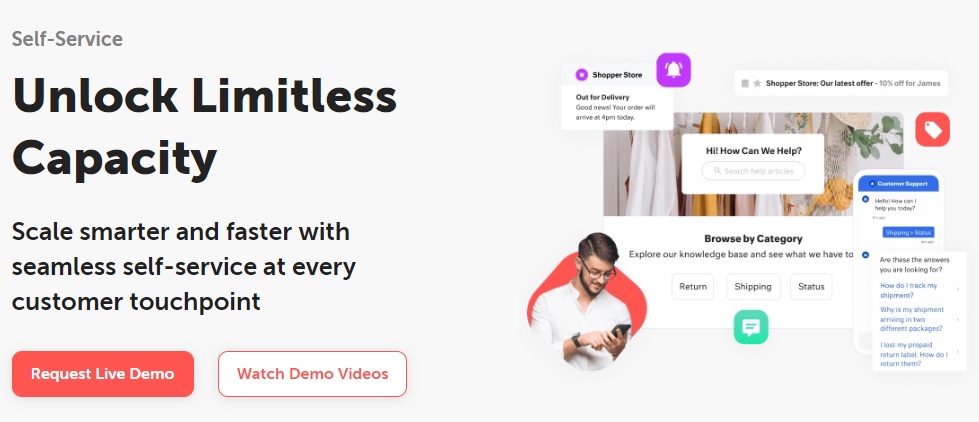
Specializing in merging CRM, customer engagement, and more into a single omnichannel platform, Kustomer is all about getting rid of disjointed systems and siloed conversations. With a focus on customer visibility and personalized assistance, Kustomer is a solid option that empowers agents, businesses, and customers.
Highlights:
- Allows you to merge your tools and integrate your existing apps and platforms all in one place
- Seamless search function integration that allows you to quickly find and share information from a unified dashboard
- Offers a turnkey tools experience for setting up customized branding, business rules, channels, and third-party platforms
Helpjuice: Your Go-To Self-Service Knowledge Base Software
Are you ready to take your customer service support to a whole new level?
Helpjuice can help.
Our knowledgebase software can provide the high-tech solutions you need to transition your customers to a self-service portal, offering more streamlined, higher-quality service available to them around the clock.
Rated the #1 knowledge base software since 2011, Helpjuice’s easy-to-use and powerful knowledge base software can help you design and offer better end-to-end customer service for your clients.
Interested in seeing how Helpjuice can take your customer service further? Sign up for a free 14-day trial today!
